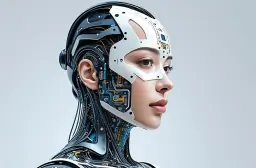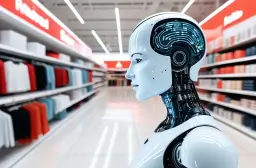How AI Transforms Daily Life: Smart Tech Innovation Unveiled

Table of Contents
Artificial Intelligence (AI) has shifted from being a futuristic concept to an integral part of our everyday lives. Imagine waking up to a home that automatically adjusts the temperature, lights, and even brews your coffee without lifting a finger. Does it sound like something out of a sci-fi movie? Well, this is not a distant dream anymore. AI-powered devices and systems are transforming the way we live, work, and interact with the world around us. The convergence of smart technology, machine learning, and intelligent automation is creating a seamless, tech-enhanced life that is more convenient, efficient, and personalized than ever before.
But what does it mean to live in an AI-driven world? Is it truly making our lives easier, or are we becoming too dependent on these technologies? These are the kinds of questions that many of us face as AI continues to permeate various aspects of daily life. From the virtual assistants that greet us in the morning to the AI-powered devices that help manage our homes, the line between science fiction and reality is blurring faster than we can keep up with. AI is no longer a novelty; it’s an essential part of modern life.
In this article, we explore how AI applications are embedded in our everyday routines, the impact they have on our productivity, and how these advancements make our lives more comfortable. With the increasing use of smart gadgets and digital assistants, let’s dive deeper into the AI-powered solutions that have reshaped daily life, from home automation to workplace efficiency.
AI in the Home: Revolutionizing Domestic Life
AI integration in the home has brought about significant changes in how we live. Smart home systems powered by AI are now commonplace, allowing us to control lights, appliances, security systems, and even our climate from the convenience of our smartphones or voice assistants. These systems use predictive technology and cognitive computing to anticipate needs and adjust settings automatically based on our behavior and preferences.
For example, a smart thermostat learns your schedule and adjusts the temperature accordingly, ensuring comfort while saving energy. Similarly, AI-powered virtual assistants like Amazon’s Alexa or Google Assistant streamline household tasks, from setting reminders to controlling music and lighting, making daily chores easier and more efficient.
Another fascinating development is the role of AI in household robotics. Devices like robotic vacuum cleaners or lawnmowers use AI algorithms to navigate around obstacles, create cleaning maps, and optimize their routes for maximum efficiency. These AI-driven gadgets are not only reducing manual labor but also enhancing the overall convenience of managing a home.
The Role of AI in Personal Productivity

AI is not only transforming the home; it’s also making a huge impact in the workplace and in our daily productivity. AI applications are being used to automate tedious tasks, manage schedules, and even provide valuable insights for decision-making. Intelligent systems are now commonplace in personal productivity tools, allowing for smoother workflows and more time-efficient work processes.
For example, AI-powered personal assistants like Google Assistant or Siri help with time management, setting up reminders, sending emails, and providing real-time information, all hands-free. These tools leverage machine learning to improve their responses over time, offering a more personalized experience as they become familiar with your habits and preferences.
Moreover, AI’s influence extends beyond personal assistants to applications designed for specific tasks. Smart calendars integrated with AI can suggest optimal meeting times based on your availability and work patterns, reducing the time spent scheduling and rescheduling meetings. Similarly, AI-driven tools are being used in business analytics to sift through vast amounts of data, helping professionals make more informed decisions faster.
AI-Powered Personalization in Entertainment
In entertainment, AI is being used to create personalized experiences that keep us engaged and entertained. Streaming services like Netflix and Spotify rely heavily on AI algorithms to recommend movies, TV shows, and music based on our viewing or listening history. These AI applications are designed to understand our preferences and predict what we will enjoy next, enhancing our user experience.
Beyond entertainment, AI is also revolutionizing the gaming industry. Game developers use AI to create more realistic and adaptive virtual environments, where non-player characters (NPCs) can learn and adapt to the player’s actions in real time. AI-driven personalization allows for more dynamic, immersive gameplay, keeping players hooked and providing a unique experience every time they play.
Furthermore, AI’s role in content creation is also on the rise. Platforms like YouTube and Instagram are using AI to recommend content, target ads, and even auto-generate captions and tags. This helps content creators reach wider audiences and provides a more tailored experience for viewers.
The Future of AI in Transportation

AI is also having a profound impact on the way we travel. Autonomous vehicles, powered by AI, are one of the most talked-about innovations in transportation. These vehicles use AI to process data from sensors, cameras, and other devices to navigate and make real-time decisions on the road.
While fully autonomous cars are still in development, we are already seeing AI integration in transportation through features like adaptive cruise control, lane-keeping assist, and automatic emergency braking, all of which rely on machine learning and AI to enhance safety and improve driving experiences.
Public transportation systems are also becoming more efficient through AI-powered predictive technology that analyzes traffic patterns, schedules, and passenger data. AI is helping transportation agencies optimize routes, reduce delays, and offer more reliable services, which ultimately improve the experience for commuters.
Ethical Considerations and the Impact of AI on Society
While AI has certainly made life easier, there are important ethical considerations that come with its integration into daily life. The more we rely on AI-powered solutions, the more questions arise about data privacy, security, and the potential for algorithmic bias.
AI-driven personalization relies heavily on user data to offer tailored experiences, but this data is often collected without users’ full understanding or consent. It’s important for users to be aware of how their data is being used and for companies to be transparent about their data practices.
Furthermore, the rise of AI automation raises concerns about job displacement. As intelligent systems take over tasks previously done by humans, the question of job security in certain sectors becomes a pressing issue. Balancing the benefits of automation with its potential societal impact is a challenge that needs to be addressed as AI continues to evolve.
FAQs
How does AI improve daily life?
AI improves daily life by automating routine tasks, enhancing productivity, and offering personalized experiences, from smart home devices to digital assistants.
Is AI going to replace jobs in the future?
AI has the potential to automate certain tasks, but it also creates new opportunities in fields like AI development, data science, and robotics.
Can AI make decisions for me?
AI can assist in decision-making by providing data-driven insights, but it’s important to note that humans still play a crucial role in final decision-making.
What are some common examples of AI in daily life?
Some examples include voice assistants like Alexa, smart home systems, AI-powered apps for productivity, personalized recommendations on streaming platforms, and autonomous vehicles.
Are AI tools secure?
While AI tools are generally secure, data privacy and security are important concerns. Users should be aware of the data being collected and how it is used.
Conclusion
AI is undeniably transforming daily life in profound ways, from smart home systems that automate everyday tasks to AI-powered solutions that enhance productivity and entertainment. As these AI advancements continue to evolve, the possibilities for an automated, tech-enhanced life are limitless. However, as we embrace the convenience and efficiency that AI brings, it’s crucial to consider the ethical implications and ensure that we maintain control over our data and privacy. AI-driven lifestyle is the future, and it’s up to us to shape how it integrates into our daily routines.
Key Takeaways:
- AI applications enhance convenience, efficiency, and personalization in everyday life.
- Smart devices and digital assistants are making homes and workplaces more automated.
- The future of AI in transportation and entertainment is set to revolutionize our experiences further.
- Ethical considerations regarding data privacy and automation will play a significant role as AI continues to advance.
Popular Tags
ADS SPACE HERE


